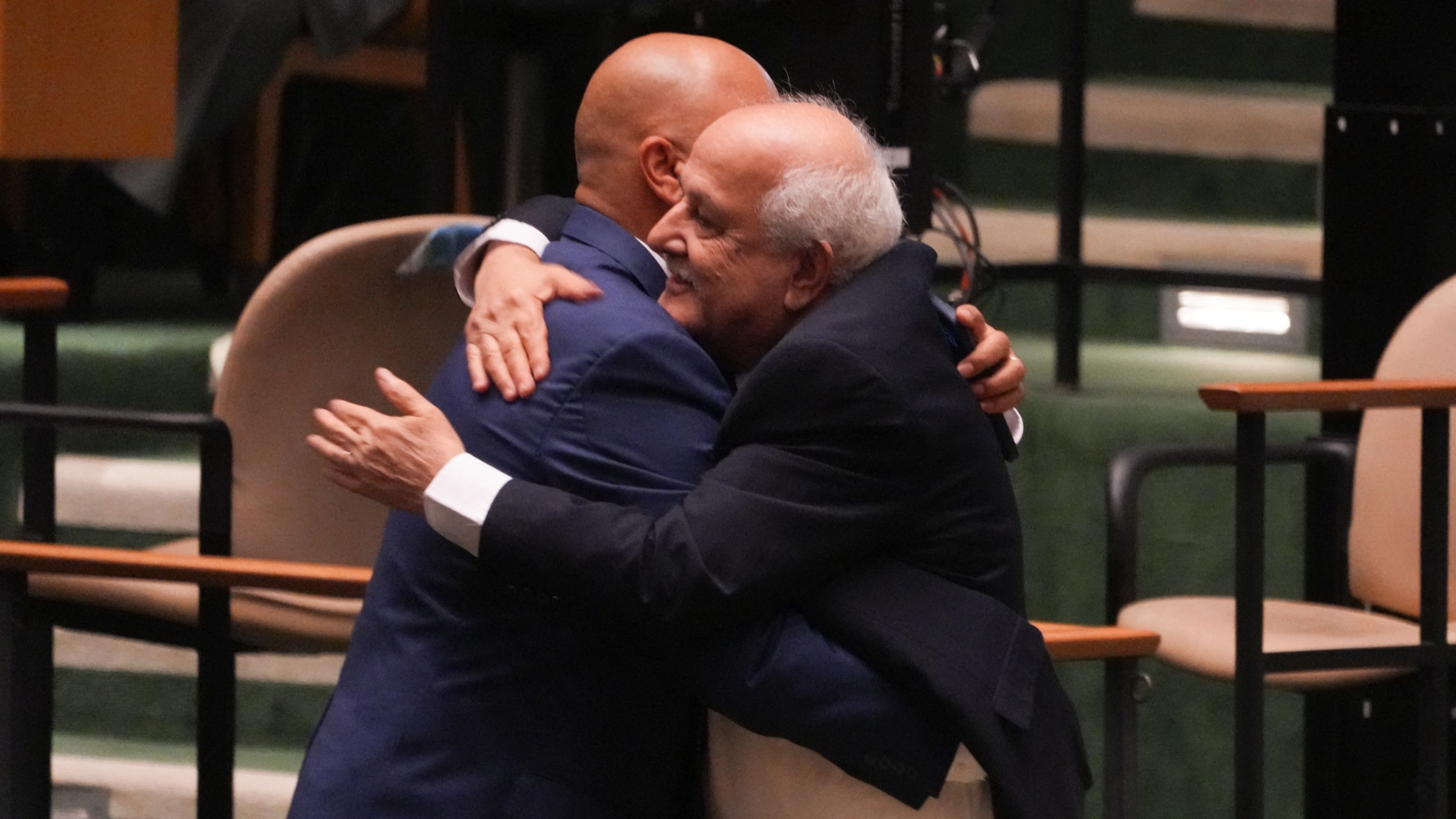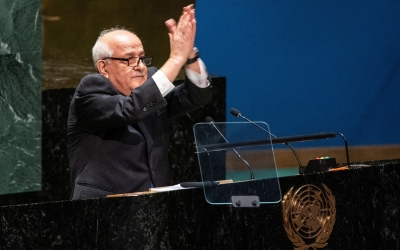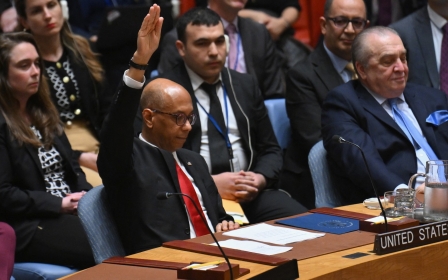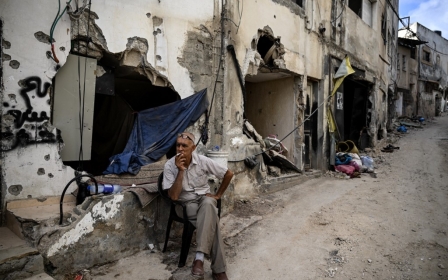UN overwhelmingly backs Palestinian resolution to end Israeli occupation

A majority of the 193-member United Nations General Assembly on Wednesday voted in favour of a Palestinian resolution demanding an end to Israel's occupation of Gaza and the occupied West Bank within a year.
The nonbinding resolution put forward by the Palestinian Authority was based on the advisory opinion of the International Court of Justice (ICJ) back in July, which said Israel’s presence in the occupied territories was unlawful and must end.
One hundred and twenty-four countries voted in favour of the resolution at UN headquarters in New York City, while 14 countries voted against it, including Israel and the United States.
The 43 countries that abstained include US allies Australia, Canada, Germany, and Ukraine.
Their ambassadors said that while they support a two-state solution, they cannot vote in favour of a resolution that does not spell out Israel’s right to defend itself.
New MEE newsletter: Jerusalem Dispatch
Sign up to get the latest insights and analysis on Israel-Palestine, alongside Turkey Unpacked and other MEE newsletters
Canada’s ambassador to the UN Bob Rae said the resolution lacks a condemnation of terrorism and suggests that only one side, Israel, is responsible for the unlawful acts in the occupied territories.
Neither the ICJ ruling nor the resolution passed on Wednesday is legally binding but it still holds weight.
“It's an important precedent because one of the main problems with Palestinian issues for the last 75 years is that nobody was putting actual deadlines,” former advisor to Palestinian leadership Nizar Farsakh told Middle East Eye.
“In international politics, it becomes a talking point that countries like South Africa or the global south, in general, can use, because it's basically the UN General Assembly– the mood of the international community,” he added.
Momentum
While the state of Palestine is not a full voting member of the UN, it has an upgraded observer status as of last May, and ambassador Riyad Mansour took his official seat in the General Assembly for the first time last week.
Momentum in favour of Palestine's full membership at the UN picked up steam after the 7 October Hamas-led attacks on southern Israel, and Israel's subsequent war on Gaza that has killed more than 41,200 Palestinians across the Gaza Strip in over 11 months of intense bombardment, including an estimated 16,700 children, according to Palestinian health officials.
Israel’s ambassador to the UN, Danny Danon, blasted the result of the vote in a post on X.
“This is a shameful decision that backs the Palestinian Authority’s diplomatic terrorism,” he wrote.
“Instead of marking the anniversary of the October 7 massacre by condemning Hamas and calling for the release of all 101 of the remaining hostages, the General Assembly continues to dance to the music of the Palestinian Authority, which backs the Hamas murderers.”
Richard Gowan, UN director at the International Crisis Group, says the resolution being presented now is a way of elevating the issue right before the high-level meetings at the UN next week, when heads of state will arrive to deliver their annual speeches.
“I think the timing of the Palestinian resolution was very deliberate. What we've seen in recent months is that although everyone remains very concerned about Gaza, the Palestinian question has been gradually slipping down the political agenda at the UN,” Gowan told MEE.
“I think leaders coming to New York are going to have to decide not only whether or not to call for a ceasefire in Gaza - which I think almost everyone will - but whether they are actually going to speak up and endorse what the General Assembly and the ICJ have said.”
The resolution put forward by Palestine calls for Israeli settlers to be removed from the areas occupied by Israel in 1967; divestment from Israeli entities profiting from that land; and compensation for Palestinians who have been living under Israeli military occupation.
The text also demands that UN member states should not “recognize any changes in the physical character or demographic composition, institutional structure or status of the territory occupied by Israel on 5 June 1967, including East Jerusalem, except as agreed by the parties through negotiations.”
That reference is to the “two-state solution” model, which since 1993 has been the only accepted plan in the international community for the creation of a Palestinian state alongside Israel.
As Israel has erected a seemingly endless stream of Israeli settlements dotting the West Bank over the last three decades - effectively ending the physical viability of two states - the popularity of a “one-state solution” for both Israelis and Palestinians has grown exponentially among younger proponents of the Palestinian liberation movement.
That notion, however, has no broad political support.
'New colonialist language'
Ahead of the UN vote, US ambassador to the UN Linda Thomas-Greenfield said the US cannot support a resolution that does not spell out Israel’s right to defend itself.
It is worth noting that Article 51 of the UN Charter already gives all member states the right to defend themselves.
But because Gaza and the West Bank are militarily occupied by Israel, this can become a “complex legal argument”, Gowan told MEE.
“The argument is that, because Israel is the occupying power in the Palestinian territories, defending itself in the Palestinian territories doesn't count as self-defence,” he added, noting that this has long been interpreted differently by different parties.
'The international community is no longer entertaining or being tolerant of the monopoly that the US has over this'
- Professor Nizar Farzakh
In her comments, Thomas-Greenfield suggested to reporters that Palestinians may be working against their own interests.
“In our view, the resolution does not bring about tangible benefits across the board for the Palestinian people,” she said. “I think it could complicate the situation on the ground.”
Farsakh, who is also a lecturer at George Washington University in Washington, DC, called the comments “a new colonialist language”.
“That narrative… is to absolve Israel - and behind them the US - from any responsibility, and put all the blame on the victims,” he told MEE.
“Part of why I'm optimistic is that this ruse is no longer working anymore. The fact that the General Assembly decided to go ahead [with the vote] without the Security Council is a precedent that shows that the international community is no longer entertaining or being tolerant of the monopoly that the US has over this, over the stewardship of the conflict.”
Middle East Eye delivers independent and unrivalled coverage and analysis of the Middle East, North Africa and beyond. To learn more about republishing this content and the associated fees, please fill out this form. More about MEE can be found here.





